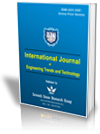Structuring a Base line Research for Energy Efficiency of Transportation in Ecuador
Citation
Henry Acurio, Francisco Izurieta "Structuring a Base line Research for Energy Efficiency of Transportation in Ecuador", International Journal of Engineering Trends and Technology (IJETT), V53(1), 48-51 November 2017. ISSN:2231-5381. www.ijettjournal.org. published by seventh sense research group
Abstract
Transport is worldwide recognized as one of the biggest energy consumers, with 27% of total energy demand. It also consumes more than 50% of the world oil demand. Likewise, in Ecuador transportation consumes about 46% of the national energy total demand. This consumption is economically correlated, as transport is one of the main activities to promote economic development of societies; Therefore, it becomes a priority to project scenarios where transport accomplishes the economic development of the country in a sustainable way. In order to implement and promote the most desirable program for energy efficiency in transport, it`s mandatory to define a baseline that identifies Ecuador`s actual situation on research and technology for energy efficiency in transportation. As a consequence a proposed methodology to build up a baseline for research in energy efficiency is introduced in this document.
Reference
[1] ISO. (2011). ISO 50001, ENERGY MANAGEMENT.
[2] IEA, I. E. A. (2014). World Energy Outlook 2014. http://doi.org/10.1787/weo-2014-en.
[3] MICSE. (2017). Balance Energético Nacional 2016.
[4] INER. (2013). Estudio de Viabilidad Tecnológica, Logística, Económica y de Sostenibilidad en General de la Introducción de Alternativas Energéticas Sustentables en la Matriz de Transporte Terrestre en el Ecuador.
[5] European Commission. (2013). Maritime, What do we want to achieve?
[6] ARCH. (2012). Despacho de combustibles Ecuador: Agencia de Regulación y Control Hidrocarburífero - ARCH.
[7] DGAC. (2013). Parque Aeronáutico Nacional - Ecuador.
[8] Rypdal, Kristin. (2000). AIRCRAFT EMISSIONS IPCC - Good Practice Guidance and Uncertainty Management in National Greenhouse Gas Inventories (pp. 93-102).
Keywords
transportation, energy efficiency, Base line, energy consumption, Ecuador.



